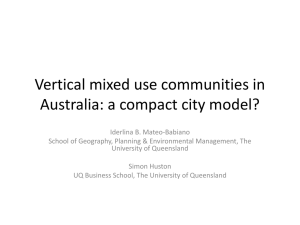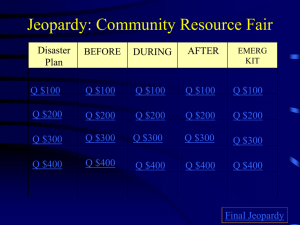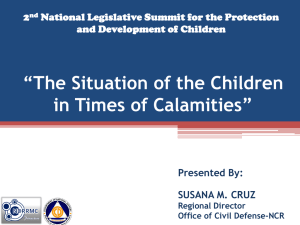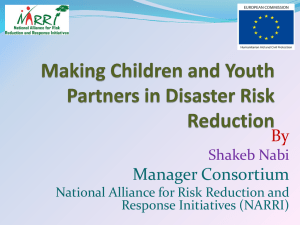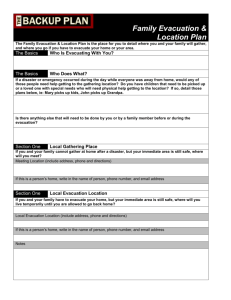Emergency Response Human Services Sub-plan
advertisement
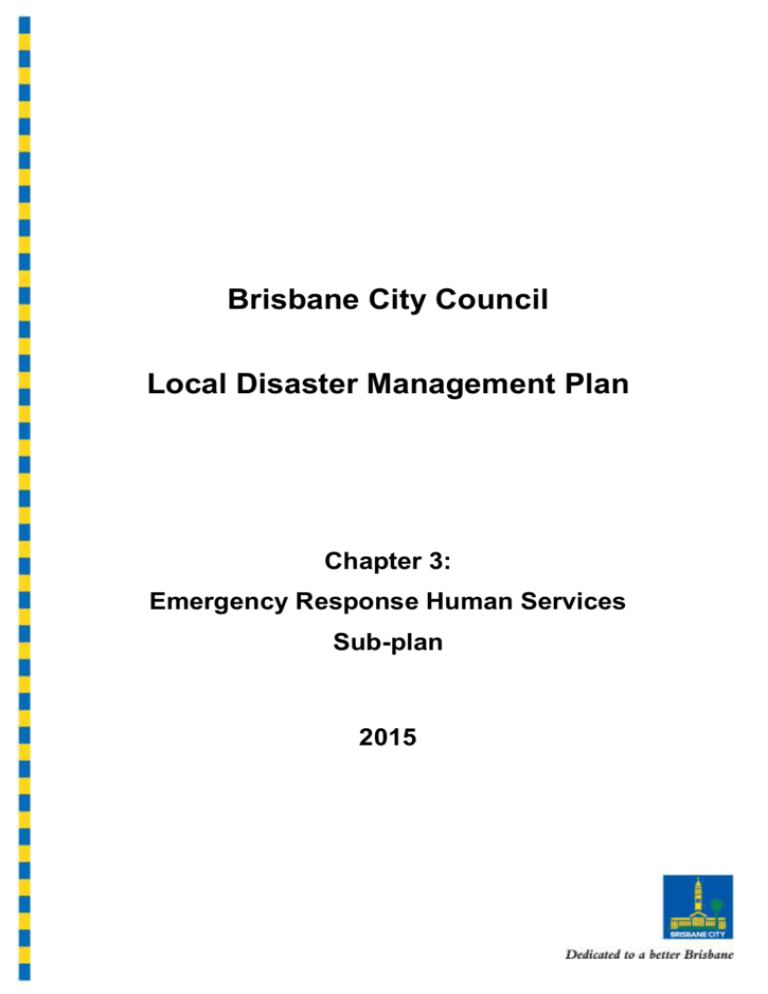
Brisbane City Council Local Disaster Management Plan Chapter 3: Emergency Response Human Services Sub-plan 2015 Brisbane City Council Local Disaster Management Plan Chapter 3 – Emergency Response Human Services Sub-plan 2015 References Table 1 summarises a comprehensive, but not exhaustive list of the many inter-related documents that provide authority for this Emergency Response Human Services Sub-plan. Table 1 Emergency Response Human Services Reference List References A. The Queensland Disaster Management Act 2003, current approved edition B. Queensland Local Disaster Management Guidelines September 2012 C. Australian Emergency Management Handbook Series – Handbook 4 – Evacuation Planning Page i of ii Brisbane City Council Local Disaster Management Plan Chapter 3 – Emergency Response Human Services Sub-plan 2015 Table of Contents References ...................................................................................................................................... I 1.0 Introduction .............................................................................................................................. 1 1.1 Audience ................................................................................................................................. 1 1.2 Approval .................................................................................................................................. 1 1.3 Custodian ................................................................................................................................ 1 1.4 Structure of the Plan................................................................................................................ 1 1.5 Media and public information arrangements ............................................................................ 2 1.6 Partner organisations .............................................................................................................. 2 1.7 Financial procedures ............................................................................................................... 2 1.8 Contact list .............................................................................................................................. 2 2.0 Overview .................................................................................................................................. 3 2.1 Purpose................................................................................................................................... 3 2.2 Scope ...................................................................................................................................... 3 2.3 Rationale ................................................................................................................................. 3 2.4 How to use this sub-plan during operations ............................................................................. 3 2.5 Planning and Coordination ...................................................................................................... 3 3.0 Emergency Human Services Operational Team ....................................................................... 4 3.1 Roles and responsibilities of the EHSOT ................................................................................. 5 3.2 Cross Agency Agreements ...................................................................................................... 5 3.3 Operations Teams ................................................................................................................... 5 3.4 Daily operating schedule ......................................................................................................... 5 3.5 Staffing .................................................................................................................................... 5 3.6 Shift handover ......................................................................................................................... 6 3.7 Establishment.......................................................................................................................... 6 3.8 Location and equipment .......................................................................................................... 6 3.9 Procurement ........................................................................................................................... 6 3.10 Communications.................................................................................................................. 7 3.11 Information and task management ...................................................................................... 7 3.12 Accounting procedures ........................................................................................................ 7 3.13 External agencies ................................................................................................................ 7 3.14 Zero Harm ........................................................................................................................... 7 3.15 Fatigue management........................................................................................................... 7 3.16 Staff welfare ........................................................................................................................ 7 3.17 Supporting Standard Operating Procedures (SOPs) ........................................................... 7 Appendix 1 – Evacuation Centre Kit ............................................................................................ 8 Appendix 2 – Acronyms and Abbreviations ............................................................................... 10 Page ii of ii Brisbane City Council Local Disaster Management Plan Chapter 3 – Emergency Response Human Services Sub-plan 2015 1.0 Introduction The Brisbane City Council Emergency Response Human Services Sub-plan is an operations level plan that sits below the Brisbane City Council Local Disaster Management Plan, prepared under the terms of the Disaster Management Act 2003 (Qld). This plan is designed to be a guide for the overall coordination and planning for emergency human services for people affected by an emergency or disaster event in Brisbane City, primarily covering evacuation, evacuation centres, volunteer coordination, donations and community support centres for isolated communities. It may also be used to care for people from other local government areas (LGAs) who need these services outside their own LGA. If required the Brisbane City Community Recovery Committee is established by the Brisbane LDMG to oversee the recovery function of the Brisbane City Council Local Disaster Management Plan. Once established, the Community Recovery Committee reports to the Brisbane LDMG on the adequacy of the planning and operational arrangements for evacuation and emergency response human services. 1.1 Audience This plan has been prepared for Council, the Lord Mayor, Brisbane LDMG, Council Business Units, and key external stakeholders. 1.2 Approval This Emergency Response Human Services Sub-plan is approved by Brisbane LDMG under the terms and provisions of the Act. 1.3 Custodian The MDMO, on behalf of Council, is the custodian of this plan. The custodian has the responsibility for implementing, evaluating, testing, reviewing and updating this plan. The custodian is also to ensure proper quality, security, integrity, consistency, privacy, confidentiality and accessibility of the plan. The Custodian’s contact details are: Title: Contact: 1.4 Manager, Disaster Management Office +61 7 3403 8888 Structure of the Plan Emergency Response Human Services Sub-plan: Includes an introduction to the plan, its structure, purpose and rationale. It also includes a description of roles, responsibilities and operational issues related to the Emergency Human Services Operational Team (EHSOT). The Emergency Response Human Services Sub-plan has five sub-plans, which are supported by Standard Operating Procedures (SOPs). These SOPs are internal documents for Council use only and are continually updated to reflect improvements and learning in Disaster Management. The latest versions are available on Council’s Brisbane Incident Management System (BIMS) Online or through the Disaster Management Office. Evacuation Sub-plan: Describes Council’s responsibilities for the evacuation of people in an emergency or disaster, the system for identifying and documenting evacuation centres and for establishing, managing, and handing over or closing evacuation centres during an event. Page 1 of 10 Brisbane City Council Local Disaster Management Plan Chapter 3 – Emergency Response Human Services Sub-plan 2015 1.5 CBD Evacuation & Reception Sub-plan: Describes the process for evacuating the Brisbane CBD and the roles of Council to work alongside Queensland Police Service and other first responders. Volunteer Coordination Sub-plan: Guides the management of volunteering in emergency events including spontaneous volunteering, mass volunteering events, corporate volunteering, team-based volunteering and volunteering in community-led recovery processes. Donations Sub-plan: Describes the range of activities undertaken to manage offers of goods in a disaster or emergency event, including receipt and dispersal of donated items. Isolated Communities Sub-plan: Outlines the use of Community Support Centres by local communities that may become isolated. Media and public information arrangements Emergencies and disasters are likely to draw significant media interest and there will be a heightened requirement for public information. The Council response to these needs is to be coordinated by the Local Disaster Coordination Centre (LDCC), specifically the Crisis Communications Team. 1.6 Partner organisations In an emergency or disaster, elements of Council will be required to work with a number of State agencies and philanthropic organisations. Therefore, Council will establish sound working relations with all entities that have a role in community recovery. This will include updating each organisation on this plan each year. 1.7 Financial procedures All costs associated with the planning, establishment, operation, maintenance and publication of emergency human services support are to be recorded on the Council financial management system as a separate function. 1.8 Contact list The contact list for key persons involved in this Emergency Response Human Services Sub-plan is available on Council’s BIMS Online. Page 2 of 10 Brisbane City Council Local Disaster Management Plan Chapter 3 – Emergency Response Human Services Sub-plan 2015 2.0 Overview 2.1 Purpose The Emergency Response Human Services Sub-plan describes Council’s role in community recovery and the provision of human services and assistance to people affected by a disaster. 2.2 Scope This sub-plan provides an overall framework and guide to assist with the planning and coordination of emergency human services in the event of an emergency or disaster in Brisbane. It covers evacuation procedures, the management and coordination of evacuation centres, volunteer coordination, donations management and community support centres for isolated communities in Brisbane. The intention is that all parties involved in human services provision have access to these guidelines and procedures to enable effective communication, coordination and allocation of resources. 2.3 Rationale In accordance with the Queensland Disaster Management System and District Disaster structure, Council has a role as a first responder to open and establish evacuation centres, to coordinate emergency human services in partnership with Australian Red Cross and to participate in the recovery of the community in partnership with State and Federal authorities. In addition, Council alongside partner agencies is well placed to draw upon an extensive network of community organisations as well as human and physical resources to have a role in the management and coordination of volunteers and donations and to support those communities isolated from the rest of Brisbane in a disaster. During a disaster, clear guidelines and procedures are critical to ensure all those involved in the coordination and provision of human services are well equipped to engage in the efficient mobilisation of large numbers of people across a diverse range of roles, at very short notice. 2.4 How to use this sub-plan during operations This sub-plan should be used as a guide and reference for identifying the relevant sub-plans and standard operating procedures and in identifying roles and responsibilities. It should be used in conjunction with other sub-plans and SOPs within the Brisbane City Council Local Disaster Management Plan. Chapter 2 of the Local Disaster Management Plan presents a community profile for Brisbane. 2.5 Planning and Coordination Community Facilities and Venues (CF&V) Branch within Brisbane Lifestyle Division will lead the coordination of emergency human services. Page 3 of 10 Brisbane City Council Local Disaster Management Plan Chapter 3 – Emergency Response Human Services Sub-plan 2015 3.0 Emergency Human Services Operational Team The Emergency Human Services Operational Team (EHSOT) is responsible for the coordination of emergency human services. EHSOT is part of the Operations Group within the Local Disaster Coordination Centre (LDCC) when activated. The role of the EHSOT is to coordinate operations and allocate resources across all aspects of the Emergency Response Human Services Plan in the event of a disaster. The EHSOT can be activated independently to the LDCC if required. The EHSOT is comprised of members from Council’s Community Facilities and Venues (CF&V) Branch and Connected Communities Branch and Liaison Officers (LOs) from key external agencies as outlined in the table below. Table 2: Emergency Human Services Operational Team (EHSOT) Organisation Position Core responsibilities Brisbane City Council Branch Manager Community Facilities and Venues or delegate Emergency Response Human Services Subplan EHSOT Manager Branch Manager, Library Services Brisbane City Council Manager Inclusive Communities or delegate Volunteer coordination Manager Healthy and Vibrant Communities or delegate Evacuation centre coordination Brisbane City Council Manager City Venues Donations coordination Brisbane City Council Manager City Hall or delegate Resupply of community support centres (isolated communities) (Moggill/Bellbowrie and Mt Crosby/ Karana Downs) Department of Communities, Child Safety & Disability Services Regional Director or delegate Recovery centres management Australian Red Cross Manager Emergency Services Evacuation centre staffing and management Lifeline (Accessed through UnitingCare Community) State Manager, UnitingCare Community Recovery Operations Psychological first aid/counselling support at evacuation centres Brisbane City Council Community support centres (isolated communities) Advice and emergency human services support Outreach at evacuation centres including assessment Donations support Contact details of EHSOT members are located on Council’s BIMS Online system. Detailed roles and responsibilities related to each sub-plan are outlined in the relevant sub-plans and SOPs. It is essential that a robust relationship is established and maintained with other response agencies. The provision of liaison officers (LOs) from these agencies is fundamental to the flow of Page 4 of 10 Brisbane City Council Local Disaster Management Plan Chapter 3 – Emergency Response Human Services Sub-plan 2015 information, development of shared situational awareness and overall successful operation of the EHSOT. 3.1 Roles and responsibilities of the EHSOT The Manager Community Facilities and Venues will be activated by the Local Disaster Coordinator (LDC) to assume the role of EHSOT Manager. The EHSOT Manager will establish the EHSOT in consultation with the LDCC Operations Manager and will: 3.2 Determine an emergency human services strategy in accordance with the type and scale of disaster; Liaise with Emergency Human Services stakeholders on issues, strategies and actions; Coordinate and manage Council’s response to emergency human services provision; Manage current operations (next 24 hours) and plan for future operations (24-72 hours); Assign tasks in accordance with the Emergency Response Human Services Sub-plan for implementation or action; Participate in operational planning meetings at the designated times; Provide information on the progress of Council’s on-ground response and communicate emerging issues; and Identify resources shortfalls and seek additional or external support where appropriate and in accordance with Council procurement guidelines, panels and arrangements. Cross Agency Agreements Brisbane City Council has formal Memoranda of Understanding (MoU) with the Australian Red Cross to manage Evacuation Centres, with Tzu Chi to assist in providing support to evacuees at established Evacuation Centres (if required), and with Surf Life Saving Queensland to enable surf lifesaving volunteers, with appropriate training and equipment, to be mobilised and tasked during natural disasters and other emergency events. Additional MoUs have been established with St John Ambulance, General Outdoor Advertising, QUT, APA Group, Energex and Bureau of Meteorology for support in times of crisis. 3.3 Operations Teams In the event of an emergency/disaster, the EHSOT has four Operations Teams that can be enacted as required across four capability ‘bricks’. These are: 3.4 Evacuation Centre Support Team; Volunteer Coordination Team; Donations Team; and Community Support Centres (Isolated Communities) Team. Daily operating schedule The EHSOT daily operating routine is to synchronise with the BIMS daily operating schedule. The EHSOT and Operations Teams will have capability to operate 24 hours as required. 3.5 Staffing The EHSOT will immediately identify staffing and resources for each Operations Team, appropriate to the level of need in accordance with each sub-plan. Page 5 of 10 Brisbane City Council Local Disaster Management Plan Chapter 3 – Emergency Response Human Services Sub-plan 2015 Staff will be drawn from Brisbane Lifestyle, other Council Divisions and external agencies if necessary. In accordance with the LDCC SOP, requests for liaison officers from external agencies are to be made through the LDCC Incident Controller. 3.6 Shift handover The outgoing EHSOT members are to provide a shift handover briefing for their incoming counterparts. This brief should cover current and outstanding activities. The outgoing person remains responsible for their duties until the shift handover is completed and the oncoming member has accepted the handover. Once the shift handover is complete, all outgoing staff are to leave the LDCC immediately. The figure below depicts the structure of the EHSOT and Operations Teams as they relate to the LDCC structure. EHSOT Structure Brisbane City Local Disaster Management Group (BCLDMG) Community Recovery Coordination Committee (CRCC) Local Disaster Coordination Centre (LDCC) Planning Operations Intelligence Support Evacuation Centre Support Team Emergency Human Services Operational Team (EHSOT) Volunteer Coordination Team Donations Team Community Support Centres (Isolated Communities) Team 3.7 Establishment The EHSOT will be established on direction of the LDC as required in consultation with the EHSOT Manager. 3.8 Location and equipment The EHSOT will be located if required at the Development Lounge, North Quay Podium, Level 1, 266 George Street, Brisbane with allocated desks, computers and phones for 10 people. In the event of a major disaster, an additional 5 people will be accommodated. One representative from EHSOT will be located in the LDCC. 3.9 Procurement An Evacuation Centre Kit will be made available to assist staff working at Evacuation Centres. The contents of the Kit are identified in Appendix 1. Page 6 of 10 Brisbane City Council Local Disaster Management Plan Chapter 3 – Emergency Response Human Services Sub-plan 2015 3.10 Communications Refer to the Support Group SOP on BIMS Online for procedures related to computer support and communications. 3.11 Information and task management Refer to the LDCC SOP on BIMS Online for procedures regarding information and task management. 3.12 Accounting procedures Purchase requisitions shall be undertaken in accordance with Council’s purchasing policy and should be made through LDCC logistics. Expenditure incurred through Council business units is to be recorded by each unit. All receipts/tax invoices for all event-related purchases must be obtained for reconciliation purposes at the conclusion of the event. 3.13 External agencies Refer to the Support Group SOP on BIMS Online for procedures on the inclusion of external Liaison Officers within the LDCC. 3.14 Zero Harm Council takes workplace health and safety seriously. It protects safety and promotes health by striving for zero harm to anyone in the workplace, at home or in public spaces through its 'Zero Harm' policy. Zero Harm is to be a paramount consideration in any response. 3.15 Fatigue management Fatigue management is to be monitored and managed by the EHSOT Manager in accordance with Council policy. More information on fatigue management is provided in the LDCC SOP and the Workforce Plan. 3.16 Staff welfare The EHSOT Manager is responsible for the welfare of all persons on shift in the LDCC or other locations such as evacuation centres. The Support Manager/Coordinator is to keep an accurate record of staff attendance at the LDCC and ensure that all pay issues are actioned accurately and promptly in accordance with Council’s EBA obligations. 3.17 Supporting Standard Operating Procedures (SOPs) SOPs that support this sub-plan can be found on BIMS Online or in TRIM container 109/555/14/620. They include: Evacuation SOP; Volunteer Coordination SOP; Donations SOP; and Isolated Communities SOP. Page 7 of 10 Brisbane City Council Local Disaster Management Plan Chapter 3 – Emergency Response Human Services Sub-plan 2015 Appendix 1 – Evacuation Centre Kit Evacuation Centre Kit Three (3) bags – marked Evac Centre 1, Evac Centre 2, Evac Centre 3 respectively that are lockable with combination lock. The combination should be noted in the Management Manual (see below). The boxes should be on wheels, have handles for ‘wheeling’ along and not exceed weight of 20kg when fully loaded (see below). Evacuation Centre Equipment Mobile phones x 3 and chargers x 3: o With phone numbers listed in contact lists (see Management Manual) o Numbers of other phones displayed on back of phones o One mobile phone marked ‘for Evacuation Centre Team Leader use’ High visibility vests (BCC logo) x 3 Raincoats/ponchos/wet weather gear – x 3 of each Sun protection – hats x 3 Sunscreen Six (6) water bottles and small snacks for 3 people Whistles on lanyards x 3 Torches x 3 with batteries in blister packs Hand sanitizer gel x 3 Centre Manual Mobile phone and dedicated line and charger Evacuation Centres On-Site Management manual including: o Location maps (how to find the venues/evacuation centres and where to park) Contact lists including: o Council’s Local Disaster Coordination Centre (LDCC) contacts o Brisbane Lifestyle Division/Community Lifestyle Branch contacts; o Venue/onsite contacts (e.g. centre management) o External contacts (e.g. Red Cross) ‘Floor Plan’ of each evacuation centre, including emergency exits ‘Set Up Plan’ – how each centre should be set up to accommodate Council Evacuation Centre Management, Red Cross Management, kitchen/food service, sleeping (including number of beds/air mattresses), eating (number of tables & chairs), socialising (number of tables & chairs), etc. ‘Evacuation Plan’ for each centre/venue MOUs for Red Cross, Surf Lifesaving, and Tzu Chi ‘Roles & Responsibilities Guide’ – laminated A4 sheet detailing scope of responsibilities for BCC and respective partner organisations such as Red Cross/St John’s Ambulance Local information pertinent to each Evacuation Centre that can be passed onto evacuees (ATMs, shops etc.) Cab Vouchers ‘Onsite Communications’ Log Book Issues Register for shift and handover Basic stationery – pens, markers, paper, cardboard, gaffer tape, scissors etc. Page 8 of 10 Brisbane City Council Local Disaster Management Plan Chapter 3 – Emergency Response Human Services Sub-plan 2015 Basic First Aid Kit Lightweight Council banners that fit into Evac. Kits For On-Going Management of the Evacuation Centre: Checklist – what else needs to be sourced and where to find it (laptops, extra banners etc.). List of rostered volunteers/Council Evacuation Centre Staff – to be provided to Evacuation Centre Team Leader once finalised and updated throughout the event. Page 9 of 10 Brisbane City Council Local Disaster Management Plan Chapter 3 – Emergency Response Human Services Sub-plan 2015 Appendix 2 – Acronyms and Abbreviations ATM Automatic Teller Machine BCC Brisbane City Council BIMS Brisbane Incident Management System Brisbane LDMG Brisbane Local Disaster Management Group CBD Central Business District CF&V Community Facilities and Venues CRCC Community Recovery Coordination Committee DMO Disaster Management Office EBA Enterprise Bargaining Agreement EHSOT Emergency Human Services Operational Team LDC Local Disaster Coordinator LDCC Local Disaster Coordination Centre LDMG Local Disaster Management Group LGA Local Government Area LO Liaison Officer MDMO Manager, Disaster Management Office MOU Memorandum of Understanding SOP Standard Operating Procedure Page 10 of 10




